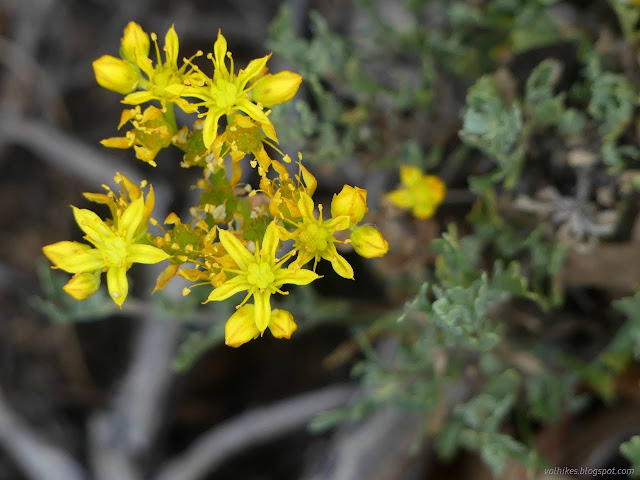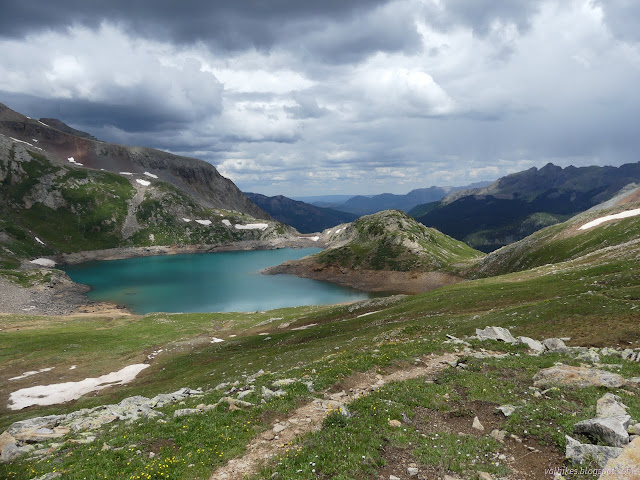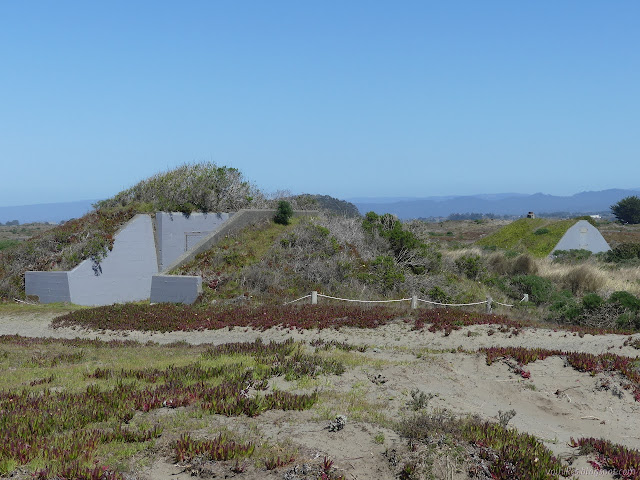Iron Springs Mesa
Uncompahgre District BLM
(map link)
The hiking options along this section of the San Miguel Canyon are few. This is a place for intermediate river rafting, and indeed I saw quite a few do so. Caddis Flats is a regular spot to put in or take out for one of the local river rafting companies. (It is also one of four free camping areas where one may stay for up to 7 continuous days in a 30 day period.) This morning, I had even seen a couple of whitewater stand up paddleboarders pumping up their boards in preparation for the day's ride. Since I have one of these things (but not with me as I don't have the space for it), I chatted with them. They said the boards were whitewater rated, which I suppose means that this is a thing. They might be early adopters, but not pioneers.
Meanwhile, I had trails to think about. At first, it looked like there was an old mining road a few miles up Leopard Creek and nothing else. Peakbaggers had done excursions to the high point of the looming mesa via a pipeline maintenance road. One had also done an excursion across the top to the named, lower, high point on the west side of the mesa. I had an initial plan to get up to both of these, heading up the canyon near the campground entrance. This got discarded when I tested a theory the day before. In about a quarter of a mile it comes to a very beautiful and very vertical box of red rock. I resigned myself to finding the bottom of this utility road and trudging up it. That is, until I noticed the bicycle tracks on a thin trail one canyon west of where I was expecting to find something. I followed them up.



I expect I was too fixated on traveling up a canyon, because I failed to follow the tire tracks. I headed up the canyon and became aware that I was definitely not on any trail anymore. Then, deciding I really should commit to either going up this canyon or finding that pipeline, I split the difference, scrambled up a hill the bicycles definitely weren't traveling, and found the old road they were taking. Maybe I was after all the pipeline? I started up it, now properly following the tracks and trail.

So I headed up this road that was clearly popular with the mountain bikers. It traveled paralleling where the tracks along the pipeline went, then turned decidedly west, because it had absolutely no interest in going where that pipeline goes. My original plan was rekindled. I would just follow this road up to the top, which would be so much easier than any canyon. Anything this popular must go all the way through, I thought with impeccable logic that misses that quite a lot of mountain bikers aren't too lazy to ride uphill.




The old road crossed the canyon I'd originally been looking to follow upward. It was certainly nothing to travel at this level, either. The road was getting cut to nothing in some of the places. Whoever was keeping the trail had stacked up rocks with rather good technique to make a more durable surface to erosion in these places. A few small limbs had tried to block the way, but these had been cut. It was an altogether pleasant way upward.


Then, quite abruptly, the road made a little round. At the end of it, I stepped around a tree and was staring down a big hole in the ground. Really, mining was the most likely explanation for it. There were even quite a lot of old juniper stumps along the way. The thing about mines is that they're often somewhere in the middle. This one was not quite halfway up to the top of the mesa. Still, the two miles it took to get there were extremely pleasant and I could see why someone was keeping the route alive as a trail.

But maybe there was a secondary road from the top? I had seen a faint cut and headed up it. I hadn't been the only one in the memory of footsteps. If it had been anything, it was probably just a way to another dig spot that wasn't used so much as the first. I had a good look at the slope, though, so decided to head upward. There are some small cliffs, so I figured I'd tend a little to the left and hope for the best.


It worked like a charm. The hardest bit was right at the start and there was even a nice level spot in the middle for a brief rest. Small gamble oaks started near the top, but never made movement difficult. Once to the top, there was half a mile along 4x4 road to the western peak and a little sage brush to get past to get to the road.


And there were actual views up there on the mesa. It actually slopes downward quite a bit toward the north, plus it has a surrounding of taller mountains.


The actual high point on the western side isn't much. There's a nice stand of big trees, but that's all.


The map said a long, looping bit of 4x4 road would take me around nearly to the eastern high point. There were extra roads at first, but the ones on the map were the ones to follow. I did take a short cut at one point, but all it did was take me to see that pipeline the peakbaggers had followed. From there, I just had to get back to the main route, making it no shortcut. The views on the western side of the mesa were better than the east.



Getting to the actual peak was described as a bad bushwhack. I guess it depends on what you are used to? I did have to push the branches slightly to get through. I've been through a lot worse. Cows live here, even if I didn't see any the evidence was close at hand, and they tend to keep spaces open. There were some views from the peak itself.


And then I started down, roughly following the tracks of those before to find that pipeline. I felt the lay of the land was a little better if I swung a little further out. It turns out, it is a lot easier to see on the side of the mountain than it is up near Wilson's Pond. It would have been hard to miss for a route down.

I met the pipeline and found it to be well used by the local elk as a path. Someone had been along it sticking flags in the ground to mark the position a couple years ago and likely maintained it as a road at that time. There was not a single tree down on it. Oh, and it was very very steep. It was not anywhere near so pleasant as the old mining road I took halfway up.



I'd have thought it was a new thing except that the trees cut to make it had been trimmed to firewood size and stacked up neatly here and there as if expecting someone to come along in their pickup and think, "Well, there, I need some firewood," and haul it away. It hadn't happened.

The views are not particularly varied as one comes down because it's rather direct, not meandering east or west. It stops before the road, which explains why no one has been trying it out with their ATV. People before had followed game trails up from a turnout next to pipeline signs. I decided to try following the ridge line, since it was heading my way. It seemed to have some good game trails down it, too.

I came down about 200 feet from where I went up and I was really glad I'd gone up that way instead. The old mining road may not have gone as high, but there was so much more to see from it and it was so much more pleasant to travel. I followed the highway the last little bit to camp, quite satisfied with the day's adventure.
*photo album*
©2022 Valerie Norton
Written 16 Jul 2022
Liked this? Interesting? Click the three bars at the top left for the menu to read more or subscribe!




Comments